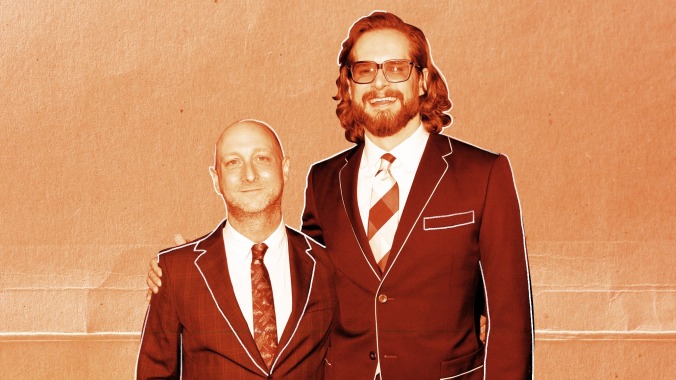Bryan Fuller and Michael Green on being “angry artists” and if we’ll ever see Lee Pace on American Gods


Bryan Fuller and Michael Green pulled off something of a miracle earlier this year, successfully adapting Neil Gaiman’s American Gods, the epic novel that’s long been deemed one the most unwieldy and un-filmable projects. Their well-received fantasy drama was renewed by Starz just weeks after the series premiere, and the first season is now out on Blu-ray. But neither showrunner is resting on their laurels, despite having other high-profile projects in the works. The A.V. Club caught up with Fuller and Green ahead of the next long haul for production to talk about keeping the show topical, wonderful, and weird.
The A.V. Club: Let’s start by revisiting the season-one finale, which was initially kind of a Hail Mary.
Bryan Fuller: That finale came together in a pretty wild, haphazard fashion in that it wasn’t supposed to be our season finale. The episode afterwards was supposed to be our season finale, and because of the rigors of production and lessons learned in launching an ambitious television series, we realized that we needed the money from our last episode to make the previous episodes rise to the occasion.
So, there was a midseason scramble when we realized we may have to lose an episode and reconfigure some of the storylines to get it more focused and punchy. And as a result, we decided to end the season an episode early and build all of the rising action to that event of recruiting Easter.
Michael Green: It was definitely one of those “happy accident” discoveries. I remember when Bryan and I were on a phone call deciding what to do with our finale—should we push into our next movement? Because our next movement of story was going to take us to House On The Rock, which is the next big set piece from the book. And we’d originally intended to begin that story so we ended with a big promise—with a big step forward into what was going to take place there. But the realization that we could maintain an appetite for that set piece and not put a foot there just to yank it away would mean that we could end it on a moment of anticipation.
It was a fairly confident move on our part, because it meant if it was not renewed, we would have ended with an unkept promise. But we had to do what we thought was strongest, in terms of creating anticipation for what would come next, and dare our benefactors to not let us get there.
AVC: Was there anything you planned to do the first season that you weren’t able to pull off, either because of logistics or the story?
MG: We’re the worst people to ask because we’ll look at the entire season and think we didn’t pull it off. [Laughs.] But there are things we failed at more nobly than other things. There were certain scenes or storylines or moments that were written and filmed that we felt weren’t at the caliber of the rest of the show that didn’t survive the cutting room floor. Those were things that we enjoyed or that we thought had promise and that we liked the integrity of on the page, but when we realized, thanks to David Slade especially in our first several episodes, we were working with a storytelling caliber that was so high, that anything that didn’t meet it, just stood out so clearly as wrong that we couldn’t keep it in.
So there were definitely some things we were hoping to put into the show that we lost and haven’t looked back.
BF: You know, it feels like it worked out pretty well because it allowed us—originally, we were going to cap the season with an event that we are now in second season exploring over the course of four episodes as opposed to one. That allows us to dig deeper into the characters and where they are as they arrive at this event. And it all feels fortuitous. That may be a defense mechanism, though, because there was no other way out.
AVC: What else can you tell us about the second season? Is Shadow going to get to be more proactive?
BF: Because so much of the first season was building vocabulary—as Mr. Wednesday says to Shadow at one point in the series—we get to utilize that vocabulary more eloquently and articulately than in the first season, because so much of it was getting the audience familiar with the language. And now we get to run with the concepts that we were working so hard to build and establish in the first season and so it does feel like the second season has much more energy, much more drive, and there isn’t the surreptitious or duplicitous quality to some of the dialogue, where all the characters know more than our protagonist. Now we are starting our second season where our protagonist knows what’s going on and can act accordingly and aggressively as a result.
MG: We also have a lot more opportunity for more of our characters to be in the same place and interact together. We have a long-awaited meet in place where we have the chance to help people who have existed in separate storylines on different coasts to come together.
AVC: We saw some of that in the first season—you guys took characters, Mad Sweeney and Laura Moon, who had disparate stories in the book and made them this great odd couple. I know Bryan had previously spoken about intentionally wanting to expand on the female characters from the book, but what was the thinking behind fleshing out Mad?
MG: We love Pablo Schreiber. [Fuller laughs.] We were so lucky to get to work with him on this. And as soon as we met with him and said “there’s this role, you can read where we are now,” and we talked to him about where we’re going. When he came on, we already had a script for episode five in hand, so he could see the beginnings of the relationship with Laura starting. And we told him that was a journey we wanted to continue going on. Then when we saw the two of them together, we thought, “This is something we enjoy so much, let’s give ourselves more of something we like,” and we just assumed the audience might like it, too.
AVC: Our real-life ongoing debate about immigration made the show’s themes especially topical in the first season, and with the change in administration, it’s probably not going away. How do you plan to handle that in the future?
BF: It feels like since the first season was written in a progressive administration and then was released in a crazy administration—now that we are crafting season two in a crazy administration, it would be impossible for it not to affect us and how we tell stories because so much about what’s happening in the world resonates in the context of American Gods. We are artists and we are angry artists—angry at the state of the country—which is going to bleed through in our commentary throughout the second season.
AVC: With that half-season arc you just teased, it sounds like you’ll be sticking with more serialized storytelling. Do you have any thoughts on bottle episodes, along the lines of “A Prayer For Mad Sweeney”?
BF: Yes, what’s exciting about season two is that it allows us to go deep into a few characters. Not only digging deeper into Shadow Moon, but in really doubling down on his import in the mythology of the show. But there are characters that you saw in the first season that had relatively minimal things to do who are going to be championing their own episodes. We love doing deep dives into the characters for a point-of-view episode, and that really is such a treat for us to just look at one person’s narrative as opposed to trying to balance a dozen different characters, and make sure you’re servicing each and every one of them in a given story.
AVC: The shows features a lot of, for lack of a better term, Bryan Fuller repertory players like Kristin Chenoweth, Gillian Anderson, and Beth Grant. And Michael, you had worked with Ian McShane before on Kings. Who are some other previous collaborators you’d like to see on American Gods?
MG: I’m gonna keep Bryan from answering because we have been in a text flurry since yesterday of excitement over people he wanted to bring in. And I am, as a fan of Bryan Fuller shows past, so excited to make good on that that I don’t want it to ruin the surprise. But if you enjoy that part of the show, there’s more cake coming.
AVC: I’m obligated to ask if Lee Pace is going to show up—he might have some availability with Halt And Catch Fire ending.
MG: [Laughs.] We both love Lee Pace and would love to work with him in any capacity at any time. He is a lovely individual and an incredibly talented actor.
AVC: This show and the book are definitely rooted in fantasy, but you both also have backgrounds in science fiction. Do you have a preference between those mediums?
MG: It’s less that either of us look for a divide between them. There’s source material that divides them that opens the flood gates for other ideas. They’re so entwined, it seems like they’re often the same thing, but one has more lasers. It’s more about living in any kind of world where the restrictions of the day-to-day world are lifted. And if that takes you to a parallel universe or just an existing universe in the future, it’s just about unfettering.
AVC: While we’re on the subject, we recently published a list of the 35 best sci-fi movies since Blade Runner, the sequel for which Michael wrote the script. What would you guys like to see on that list?
BF: Oh my goodness.
MG: Ex Machina.
BF: I was just going to say Ex Machina.
MG: Yeah, it’s such a wonderful synthesis of deep character story in a sci-fi setting where the sci-fi setting was just a delivery system for wonderful visual and emotional storytelling.
BF: And another one that’s not so much a science fiction story but a psychological story told with science fiction tropes is Fight Club. Which I think has taken the hybridization of a psychological tale told like a science fiction tale and created a new genre.
AVC: In addition to writing movie sequels, Michael, you have other projects going; and Bryan, you’ve got that Amazing Stories remake in development. Will you both remain as hands-on with American Gods season two?
MG: Oh yes, this show is more than front burner for both of us—it is front bonfire. So this is where our hearts lie, this is where our hours are spent. American Gods is home.